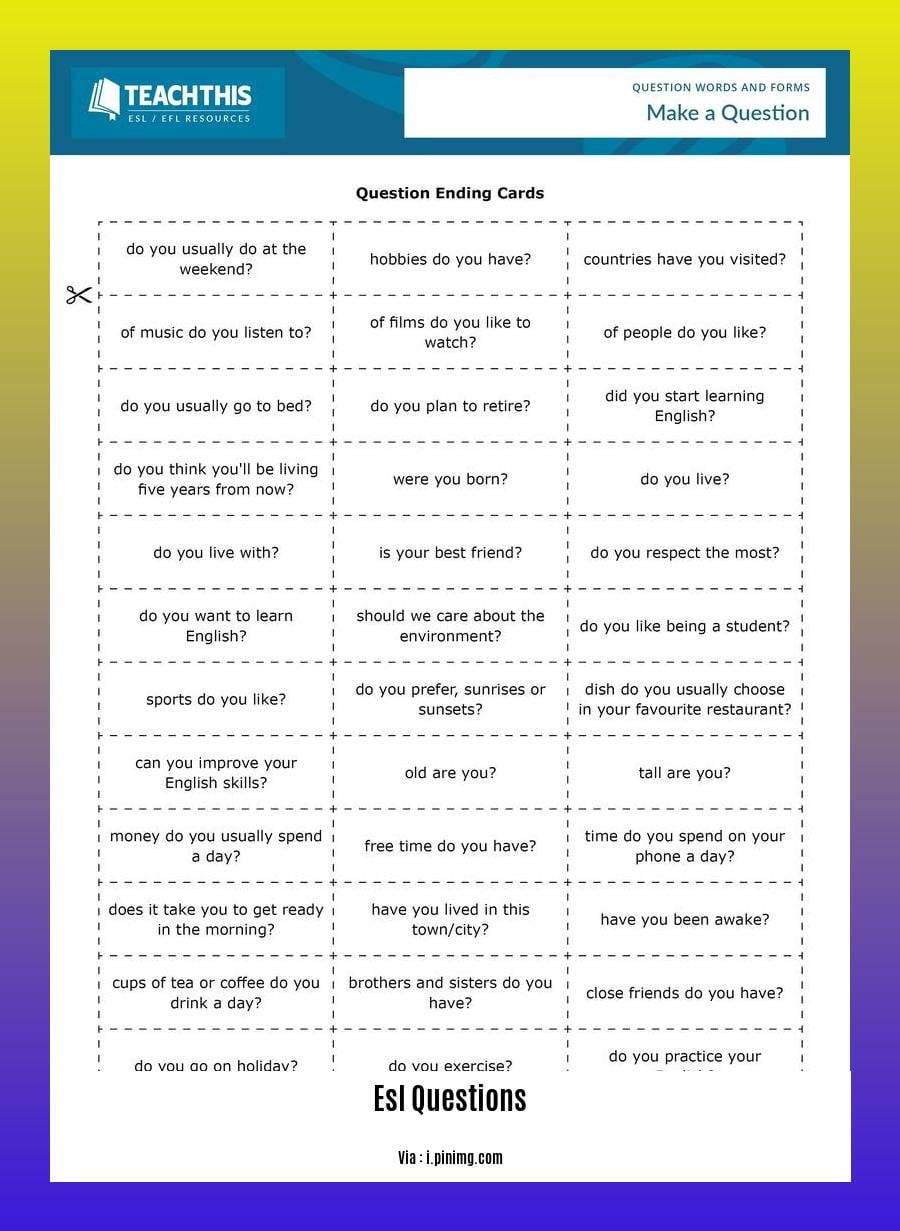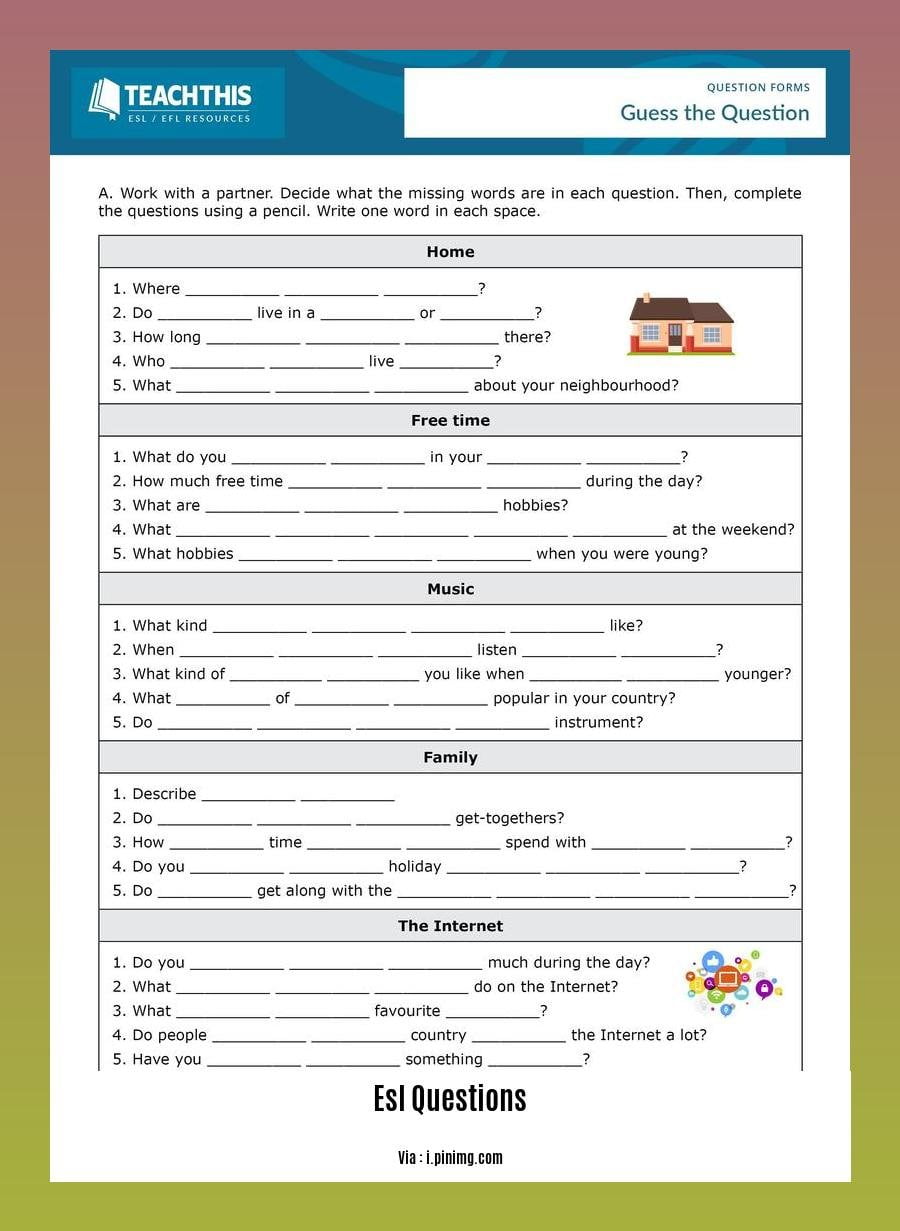Are you an ESL learner looking to boost your English language skills? If so, we’ve got you covered! In this article, we will explore essential ESL questions about everyday life that will help you improve your English fluency and confidence. Whether you’re wondering how to navigate conversations at the grocery store or want to learn phrases for ordering food at a restaurant, we have practical solutions and guidance that will enable you to tackle everyday life situations with ease. Let’s dive in and enhance your English language skills together!
Key Takeaways:
- Discussing daily routines helps students practice time-related vocabulary and verbs.
- Asking about hobbies and interests encourages students to engage in conversation and develop their speaking skills.
- Exploring living preferences can lead to discussions about urban and rural advantages and disadvantages.
- Hands-on activities, such as reading exercises and roleplays, simulate real-life scenarios and improve communication skills.
- Online resources, such as ESL Conversation Topics and ESL Questions About Daily Life, provide additional practice materials for self-study or classroom use.
ESL Questions About Everyday Life

Daily life is a rich topic for English language learners to practice their speaking and comprehension skills. By asking questions about everyday routines, hobbies, and living preferences, students can engage in meaningful conversations and expand their vocabulary. In this guide, we’ll explore key points to consider when addressing ESL questions about everyday life.
Daily Routine
Let’s start with discussing daily routines. This is a great way for students to learn vocabulary related to everyday activities. Take a moment to describe your own typical day, from morning to night. Use time-related vocabulary and verbs to explain activities such as waking up, brushing your teeth, having breakfast, going to work or school, and relaxing in the evening.
Free Time Activities
Now, let’s inquire about your hobbies and interests during your free time. Share with us what activities you enjoy doing and why you find them enjoyable. This can lead to conversations about various topics, including sports, music, movies, books, and more. Feel free to ask follow-up questions to further engage in conversation and develop your speaking skills.
Living Preferences
Next, let’s discuss living preferences. Do you prefer living in a city or in the countryside? Explain the reasons behind your choice. This can lead to interesting discussions about the advantages and disadvantages of urban and rural living. Consider factors such as access to amenities, transportation, noise level, and natural surroundings.
ESL Activities
Now, let’s highlight the importance of hands-on activities in ESL classrooms. These activities can enhance your learning experience and improve your communication skills. For example, you can engage in reading exercises that focus on everyday tasks, such as grocery shopping or cooking. Roleplays can simulate real-life situations like buying items at a store or ordering food at a restaurant. This allows you to practice English in context and develop fluency.
Online Resources
To further enhance your learning, there are various online resources available. Websites like ESL Conversation Topics and ESL Questions About Daily Life offer a wide range of conversation topics, questions, and exercises. These resources often include vocabulary lists, sample dialogues, and speaking prompts that can be used for self-study or in the classroom. Explore these resources to deepen your understanding of everyday life in English.
By incorporating ESL questions about everyday life into your language learning journey, you can improve your vocabulary, grammar, and conversational skills. Engaging in discussions about daily routines, free time activities, and living preferences encourages critical thinking, cultural exchange, and language fluency.
Drinking water is not just essential for your overall health, but it also plays a crucial role in hair growth. Want to know how drinking water can promote luscious locks? Check out our article on drinking water good for hair growth to uncover the secrets.
Have you been hearing a lot about the Everclean 5 day detox? Curious to know if it actually works or just another fad? Our comprehensive Everclean 5 day detox reviews reveal the real results and experiences of users. Dive in to find out more!
Wildlife holds immense importance in maintaining the balance of our ecosystem. Do you want to explore the incredible role wildlife plays in our world? Click here to learn about the importance of wildlife and why we must protect it for future generations.
Common Questions to Ask When Shopping for Groceries
As an ESL learner, it’s important to practice speaking and comprehension skills related to everyday life situations. One common scenario many of us encounter is grocery shopping. Whether you’re navigating a supermarket or exploring a local market, knowing the right questions to ask can make the experience smoother and more enjoyable.
Types of Grocery Stores and Markets
When it comes to grocery shopping, there are various types of stores and markets around the world. Asking about these differences can help you expand your vocabulary and gain cultural knowledge.
Some common questions to ask include:
– What types of grocery stores are popular in your country?
– How do supermarkets differ from local markets?
Finding Specific Items
A common challenge when shopping for groceries is finding specific items. Language barriers and unfamiliar store layouts can make this task daunting. Here are some questions that can help you navigate the aisles more effectively:
- Excuse me, where can I find [specific item]?
- Do you carry [specific brand]?
- Could you please point me in the direction of the [specific section]?
Understanding Prices and Discounts
Understanding prices and any available discounts is essential for managing your budget. Here are some questions you can ask to ensure you’re getting the best deals:
- Is there a special offer on [specific item]?
- Are there any discounts for buying in bulk?
- Do you have a loyalty program?
Seeking Assistance and Help
Whether you’re struggling to find an item or need assistance at the checkout, don’t hesitate to ask for help. These questions can come in handy when you need assistance:
- Can you help me find [specific item]?
- Is there someone who can assist me with my groceries?
- How do I use the self-checkout?
Talking About Preferences and Recommendations
Engaging in conversations with staff members or fellow shoppers about preferences and recommendations can enhance your shopping experience. Consider asking questions such as:
- What’s your favorite [type of product]?
- Are there any new or popular items worth trying?
- Do you have any suggestions for quick and easy meals?
Key Takeaways:
- Knowing the right questions to ask when shopping for groceries can enhance your overall experience and help you navigate the store more effectively.
- Understanding the different types of grocery stores and markets can expand your vocabulary and cultural knowledge.
- Asking about specific items, prices, and discounts ensures you’re making informed choices and managing your budget effectively.
- Don’t hesitate to seek assistance and ask for help when needed.
- Engaging in conversations about preferences and recommendations can provide valuable insights and make your shopping trip more interesting.
For more resources and activities related to learning English as a Second Language, you can visit the following websites:
- ESLVault – Shopping Discussion Questions
- EnglishPost.org – Discussion Questions About Shopping
Remember, the more you practice, the more comfortable and confident you’ll become in using English to navigate everyday life situations like shopping for groceries.
Important Questions to Ask When Navigating Public Transportation

Public transportation can be a convenient and cost-effective way to get around, especially in busy cities. However, navigating public transportation can sometimes be challenging, especially for ESL learners. To help you navigate public transportation with confidence, here are some important questions to consider:
1. How do I find the right bus or train?
Finding the right bus or train is crucial when using public transportation. Without proper knowledge, you may end up on the wrong route or get lost. Here are some questions to ask:
- Where can I find the bus or train schedule?
- How do I read the schedule to understand the departure time and destination?
- Are there any specific routes or stops I need to know?
- Are there any alternative modes of transportation available?
2. How do I pay for public transportation?
Paying for public transportation can vary depending on the city and the mode of transportation. Before boarding, make sure to ask the following questions:
- What are the different payment options available?
- Do I need to purchase a ticket in advance or can I pay onboard?
- Is there a specific card or pass that I can use for multiple trips?
- Are there any discounts available for students or seniors?
3. How do I navigate ticket machines or fare gates?
Ticket machines and fare gates can be intimidating for first-time users. To avoid confusion and delays, ask these questions:
- Is there a specific way to operate the ticket machine or fare gates?
- What types of tickets or cards are accepted?
- Are there any instructions in multiple languages?
- Is there customer service available for assistance?
4. How do I know when to get off the bus or train?
Knowing when to get off the bus or train is essential to avoid missing your stop. Here are some questions to help you navigate your journey:
- How do I recognize my stop?
- Are there any announcements or signs to indicate upcoming stops?
- Can I use a mobile app or GPS to track my location?
- Are there any landmarks or visual cues to help me identify my stop?
5. What safety precautions should I take while using public transportation?
Safety is always a priority when using public transportation. To ensure your well-being, ask the following questions:
- Are there any specific rules or regulations to follow while onboard?
- Are there any potential safety hazards to be aware of?
- Is it advisable to travel alone, especially during late hours?
- What do I do in case of an emergency or if I feel unsafe?
6. How can I access additional information or assistance?
Having access to additional information and assistance can make your journey smoother. Ask these questions to ensure you are well-informed:
- Is there a customer service hotline I can contact for inquiries?
- Are there any online resources or apps that provide real-time updates?
- Are there maps or guides available at the stations or stops?
- Are there any helpful phrases or keywords in the local language that I should know?
Remember, asking these important questions will not only help you navigate public transportation but also improve your English language skills. Practice speaking and comprehension by using these questions in role plays or conversations with native speakers.
Key Takeaways:
– When navigating public transportation, it’s important to ask questions about finding the right bus or train, payment methods, ticket machines or fare gates, recognizing your stop, safety precautions, and accessing additional information or assistance.
– Knowing how to find the right bus or train, understanding payment options, navigating ticket machines or fare gates, recognizing your stop, prioritizing safety, and accessing additional information or assistance are essential for a smooth public transportation experience.
– By asking these questions and seeking guidance, ESL learners can improve their speaking and comprehension skills related to navigating public transportation.
Sources:
– ESL Gold: Lesson: Transportation
– TEFLpedia: Public transport conversation questions
Useful Questions to Ask When Seeking Directions or Assistance in a New City
Key Takeaways:
- Asking for directions or assistance in a new city can be challenging, but having a set of useful questions can help overcome language barriers and navigate unfamiliar surroundings.
- By asking specific questions about landmarks, street names, and the layout of the neighborhood, you can gather relevant information to reach your desired destination.
- It’s important to be polite and respectful when seeking directions, as locals are more likely to assist you if you approach them with courtesy.
- Utilize online resources, such as ESL websites and conversation question lists, to practice and improve your English language skills related to giving and receiving directions in a new city.
When you find yourself in a new city and need directions or assistance, it’s helpful to have a set of useful questions in your arsenal. These questions will not only help you overcome language barriers but also gather the necessary information to reach your destination. Let’s dive into some essential questions you can ask when seeking directions or assistance in a new city.
Excuse me, could you please tell me how to get to the nearest supermarket?
This question is perfect for finding the nearest supermarket in a new city. It’s concise and polite, making it easier for locals to understand and provide the necessary directions.Are there any landmarks or notable buildings I should look out for along the way to school/work?
By asking this question, you’ll be able to identify significant landmarks or buildings that can serve as reference points on your route. This will make it easier for you to navigate the unfamiliar surroundings.What are the names of the main streets in this city/town?
Knowing the names of the main streets in a new city will help you communicate your location more effectively and understand directions given by locals.Do you have any tips for giving directions to a lost tourist in this area?
Asking this question shows your willingness to learn and adapt to the local culture. Locals will appreciate your effort and may provide you with helpful tips for giving directions to other lost tourists.Could you give me a description of the layout of your neighborhood?
This question will help you understand the general layout of the neighborhood, including any distinctive features or landmarks. It will enable you to navigate the area more efficiently.Have you ever gotten lost in this city? How did you find your way back?
By asking locals about their personal experiences of getting lost and finding their way back, you can gain valuable insights and possibly discover alternative routes or strategies to navigate the city effectively.
Remember, when seeking directions or assistance in a new city, it’s essential to be polite and respectful. Approach locals with courtesy and gratitude for their help. Engaging in conversations with locals not only helps you improve your English language skills but also allows you to connect with the community and learn more about the local culture.
To further enhance your English language skills related to giving and receiving directions, consider utilizing online resources. Websites like ESL Questions About Directions and Useful Expressions for Asking for and Giving Directions in English provide helpful conversation topics, questions, and exercises for self-study or classroom use.
Remember, practice makes perfect! The more you engage in conversations and seek assistance in a new city, the more confident you’ll become in navigating everyday life situations with ease.
Sources:
– ESL Questions About Directions, eslquestionsabout.com
– Useful Expressions for Asking for and Giving Directions in English, eslbuzz.com
FAQ
Q1: Why are everyday life questions important in ESL classrooms?
A1: Everyday life questions are important in ESL classrooms because they allow students to practice speaking and listening in English while also learning vocabulary related to daily activities and routines. These questions help students develop their conversational skills, improve language fluency, and engage in critical thinking and cultural exchange.
Q2: What are some examples of daily routine questions for ESL students?
A2: Some examples of daily routine questions for ESL students include:
– Can you describe your typical day from morning to night?
– What time do you usually wake up and go to bed?
– What activities do you do in the morning before going to work or school?
– What do you like to do in the evenings to relax?
– Do you have any specific routines or rituals that you follow every day?
Q3: How can free time activities questions enhance ESL learning?
A3: Free time activities questions can enhance ESL learning by allowing students to discuss their hobbies and interests in English. These questions help students practice speaking about their favorite activities and develop their conversational skills. Additionally, discussing free time activities can lead to engaging conversations about various topics such as sports, music, movies, and books.
Q4: Why is it important to explore living preferences in ESL discussions?
A4: Exploring living preferences in ESL discussions allows students to express their opinions about whether they prefer living in a city or in the countryside. This topic can lead to discussions about the advantages and disadvantages of urban and rural living, fostering critical thinking and cultural exchange. Students can also learn and practice vocabulary related to amenities, transportation, noise level, and natural surroundings.
Q5: How can hands-on activities related to everyday life improve ESL language acquisition?
A5: Hands-on activities related to everyday life, such as reading exercises, roleplays, and conversations, can improve ESL language acquisition by providing practical and interactive learning experiences. These activities allow students to practice real-life scenarios, such as grocery shopping or ordering food at a restaurant, and apply their language skills in a meaningful way. Through these activities, students can improve their communication skills and gain confidence in using English in everyday situations.
- Unlock 6000+ words beginning with he: A comprehensive analysis - April 20, 2025
- Mastering -al Words: A Complete Guide - April 20, 2025
- Master Scrabble: High-Scoring BAR Words Now - April 20, 2025
















